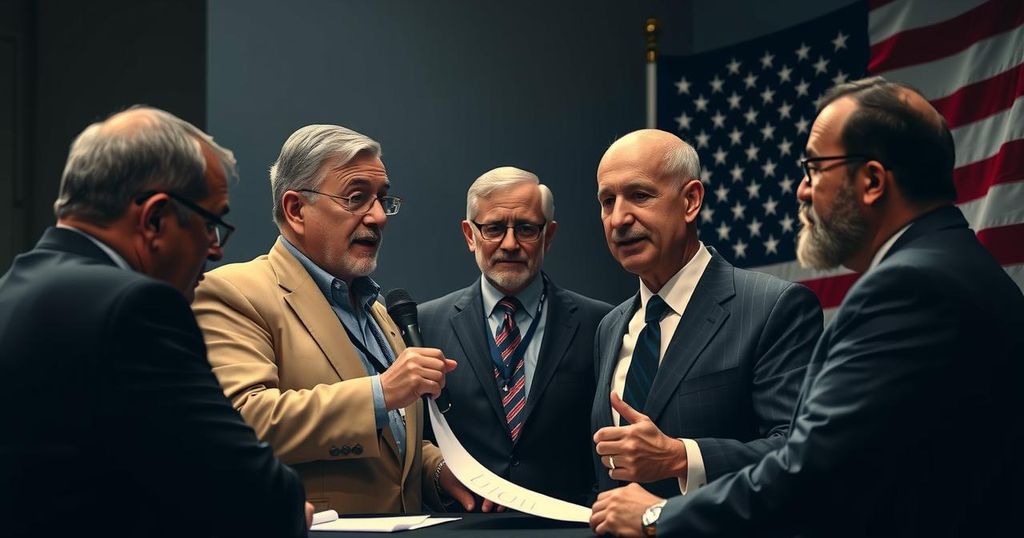World news
ANTISEMITISM, ASIA, AUSTELL, BENJAMIN NETANYAHU, CHRISTIANITY, CINDY, CINDYE COATES, DONALD TRUMP, ELECTION, EUROPE/ASIA, GAZA, GAZA STRIP, GEORGIA, ISRAEL, LEBANON, MARIETTA, MARJORIE TAYLOR GREENE, MICHAEL WHATLEY, MIDDLE EAST, NORTH AMERICA, STAN COATES, THREATS, TRUMP, TRUMP ADMINISTRATION, U.S. ELECTIONS, UNITED STATES, US, WHAT, WHATLEY
Amira Khan
0 Comments
Navigating Faith and Politics: Conservative Christians’ Response to Trump’s Israel Policy
During the lead-up to the United States general election, Donald Trump and his allies intensified efforts to secure support from conservative Christians, addressing moral concerns while affirming the party’s commitment to pro-life, pro-family, and pro-Israel stances. Internal dissent has grown regarding unconditional support for Israel amid the Middle East conflict, reflecting a more critical perspective among some evangelical voters, particularly the youth, who question the necessity of extensive foreign aid. This article highlights the complex dynamics at play within the conservative Christian community as they navigate their political affiliations in relation to contemporary issues.
In the final stretch leading up to the United States general election, former President Donald Trump and his supporters have intensified their efforts to engage conservative Christians, a significant voter demographic. Through a series of gatherings labeled as “Believers for Trump” and “Believers and Ballots,” they have aimed to address lingering doubts regarding Trump’s moral standing, which has been a point of contention since the onset of his political career in 2015. Despite indications of declining Christian voter enthusiasm, Republican figures assert that their party embodies conservative Christian principles. Michael Whatley, Chairman of the Republican National Committee, emphasized at a rally in Austell, Georgia, a pivotal state with a robust evangelical population, that the GOP remains staunchly pro-life, pro-family, and pro-Israel. However, the ongoing conflict in the Middle East has caused some attendees to question the unwavering support for Israel, particularly in light of significant civilian casualties during the recent hostilities. Cindye Coates, a conservative pastor, criticized the party’s alignment with Zionism, advocating instead for the prioritization of humanitarian efforts within the United States. This sentiment reflects a growing unease among portions of the conservative Christian community regarding the GOP’s stance towards foreign aid and military support for Israel, juxtaposing it with a more isolationist viewpoint espoused by Trump. Polling data highlight Trump’s appeal among various Christian voter segments: 82% of white evangelical Protestants and over half of non-evangelical Protestants and Catholics support him. Yet, a notable percentage of young Republicans are increasingly skeptical of the party’s foreign policy, advocating for an arms embargo against Israel and questioning the need for extensive foreign aid. Despite Trump’s self-proclamation as a protector of Israel, some within the evangelical community are disillusioned by the conflation of political allegiance with religious doctrine concerning the Israeli state. This growing rift is evident as certain pastors emphasize a humanitarian perspective toward the Palestinian plight, particularly as civilian suffering mounts in conflict zones. Mark Watkins, a Pentecostal preacher, remains fervently supportive of Trump’s policies, aligning his religious convictions with Republican priorities on issues such as abortion and transgender rights. Overall, as the election approaches, the Republican Party seeks to galvanize its base by reaffirming its commitment to Israel while simultaneously grappling with intra-party dissent grounded in evolving perspectives among conservative Christians concerning foreign aid and humanitarian considerations.
The article discusses the dynamic between conservative Christians and the Republican Party in the context of the upcoming United States election. It highlights Trump’s engagement strategies targeting evangelical voters, particularly in Georgia, a crucial battleground state. The narrative explores contrasting views within this demographic relating to Israel, suggesting some conservative Christians are questioning the party’s unconditional support for Israel amid ongoing violence in the region, which they feel conflicts with an ‘America First’ ideology. It also reflects on changing attitudes among younger Republicans towards foreign aid, providing a comprehensive understanding of the shifting landscape within conservative Christian voting behavior.
In conclusion, the Republican Party, under Trump’s leadership, faces a complex challenge in reconciling its foreign policy, particularly regarding Israel, with the evolving views of its conservative Christian base. While the party continues to hold a significant share of support from evangelical voters, internal dissent regarding humanitarian concerns related to foreign aid is emerging. As the election approaches, it remains to be seen whether this discord will impact Trump’s appeal among conservative Christians or if traditional alignments will hold firm.
Original Source: www.aljazeera.com




Post Comment